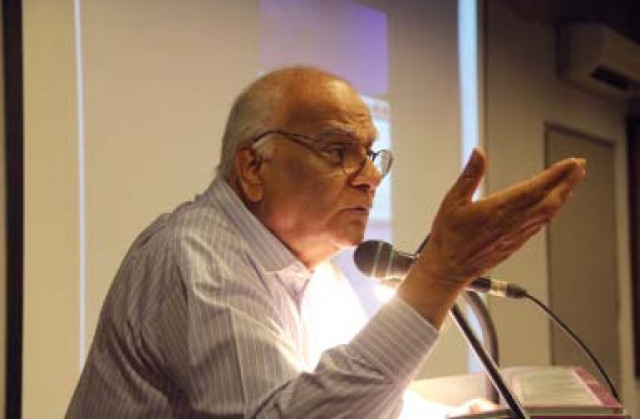Karachi’s changing landscape: Towering architect Habib Fida Ali doesn’t mind high-rises but says design them well
Need should be the basis of a blue-print, he urges, saying the physically challenged can’t be ignored.

Habib Fida Ali’s experience is perhaps as grand in scope as some of the buildings he has designed over four decades in Karachi.
He is the man behind head offices of National Bank of Pakistan, Sui Southern Gas Company, Faysal Bank and Shell. He renovated Mohatta Palace and designed The Forum shopping mall, CAS school and LUMS university in Lahore.
“I have received some of the best suggestions in designs from my clients,” he said, speaking at Alliance Française de Karachi on Thursday night. “An architect should never think he is a supreme authority. Always keep yourself open to ideas.”
Sometimes, he had to fight with the clients. “The LUMS people didn’t have a master plan for the university and the brief they gave us was not enough.”
He travelled around the world, stopping at universities in Canada, Istanbul and Iran to see how the institutions were designed there.
Buildings have to be conceived on the basis of need, he said. “In most cases people don’t know what they want. They find something interesting in a magazine and say, build us a house like this. But that doesn’t work.”
Just for the sake of knowing the clients better, to understand what kind of a house they want, Ali has spent weeks living with them. “I lived for a month with GM Adamjee before designing the family house in Karachi.”
For 76-year-old Ali, who lives in a 120-year-old house, it doesn’t matter if the shape of Karachi is changing. “I have nothing against high-rises. They just have to be designed properly. If an earthquake hits us, half of them will collapse.”
The increase in the price of land has forced people to sell their colonial-era houses, he said. “There are still many beautiful buildings left along II Chundrigar Road and in Kharadar.”
While the few speakers who had come to listen to him were in mourning over the poor condition of old buildings in the city, Ali said architects must look forward. “Times are changing. I hate computers. I still hand-sketch my designs but I can’t deny the utility of computers. And so if a client wants some place for the machines in the design, I give it to him.”
Architects must be progressive, he urged. “They should look back in history to take inspiration but not imitate old designs. They must come up with their own ideas.”
These days, people who can afford it, want home theaters and gyms in their houses, he said. “Just a few years back, this idea would have looked absurd for homes in Karachi.”
More than anything else, he said that the advertisement billboards which have sprung up on every major highway have disfigured Karachi. “I was on the committee, which was looking into the matter, and the attitude of government officials was that they used billboards to beautify the city. You can put up an advertisement anywhere you want.”
Architects designing public buildings often ignore the needs of the physically challenged, he said. “But this is where local authorities have to ensure that buildings have ramps and toilets for people who are in wheelchairs.”
Published in The Express Tribune, April 7th, 2012.


















COMMENTS
Comments are moderated and generally will be posted if they are on-topic and not abusive.
For more information, please see our Comments FAQ